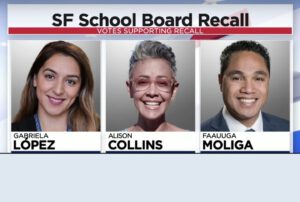New California law cuts local school board control over educational content
(The Center Square) – California governor Gavin Newsom signed a new bill into law that would significantly reduce the ability of local school boards to shape local curriculums, even within…

(The Center Square) – California governor Gavin Newsom signed a new bill into law that would significantly reduce the ability of local school boards to shape local curriculums, even within previous state educational guidelines, and stop their removal of any books from school libraries if they “provide inclusive and diverse perspectives,” no matter how questionable the content may be for a library serving a more limited age group.
“Rather than limiting access to education and flat-out banning books like other states, we are embracing and expanding opportunities for knowledge and education, because that’s the California way,” said California State Superintendent Tony Thurmond, who sponsored the bill, in a public statement celebrating the new law. Thurmond recently announced his decision to run to succeed Newsom when he either terms out or potentially runs for higher office.
The bill, AB 1078, took effect immediately upon its signing and prevents school districts from failing to adopt textbooks approved by the California Department of Education by creating a mechanism for the county superintendent to request the CDE purchase the needed materials and automatically pass the costs on to the school district in question. It also requires a ⅔ supermajority, not a simple majority as before, of school board votes to remove any “inclusive” curriculum elements, and give parents a means of challenging any such removals with the county’s Board of Education. The new law also prohibits “banning instructional materials or library books on the basis that they provide inclusive and diverse perspectives.”
“AB 1078 removes all legislative power given to local school board trustees by the voters who put them in office,” said California Policy Center Vice President of Government Affairs Lance Christensen in an interview with The Center Square. “This is the Protect the Bully Act of 2023, and the bully is the superintendent of public education.”
Critics say the bill is logistically unworkable, creating a significant new workload for school administrations and the CDE, can easily be utilized by any parents to overwhelm the system with complaints, and unfairly reduces the power of elected school boards whose control over local curriculums and other educational decisions were delegated by the state legislature. There are also concerns that because most school districts in the state do not have sufficient textbooks in general, uniform enforcement of the bill could result in school districts facing fines they are unable to afford for textbooks they didn’t have the money to buy.
“Most school districts don’t have sufficient textbooks across the board for any subject, including science and math,” Christensen said.”
Christensen said he and his staff are creating a template that will allow parents to easily submit complaints for having overtly racist or otherwise prohibited content in libraries and curriculums to “overwhelm the system” and “make it so difficult for the county boards and the state superintendent to adjudicate that they abandon it.”
After hearing what Christensen said, Jonathan Zachreson, founder of parent activist group Protect Kids California, told The Center Square, “[AB 1078] makes it very easy for people to gum up the system from either side. And that’s probably why you saw the California School Boards Association, which is normally very left leaning in their policies, even they came out against it. Even the California Teachers Association wasn’t for it because they recognized how problematic it would be for schools to administer this law.”
In addition to the potential high costs school boards might face, the law also prohibits the removal of books that some say might not be age appropriate, especially at schools that serve both pre-pubescent and adolescent students, such as the public school for 4th through 8th graders Christensen sends his children to school to.
“Most of the time, activists have brought inappropriate material to the library, either through a parent or an activist employee, and parents have those materials removed. Parents want to get rid of the age-inappropriate materials and Newsom is calling them book burners to exploit them for his own political purposes,” said Zachreson.
“I have a really hard time calling the curation of books a ban. The books aren’t banned, they’re simply not put in libraries,” said Christensen. “They have books about graphic sexual acts without regard to age-appropriateness. These are the same libraries that don’t want the Bible in the library because it might be controversial.
For context on the type of content typical of books removed from libraries by school boards, Christensen suggested listening to a recent United States Senate session in which Senator John Kennedy, R – Louisiana, read excerpts from some of the most-removed books, including “All Boys Aren’t Blue” and “Gender Queer.”



